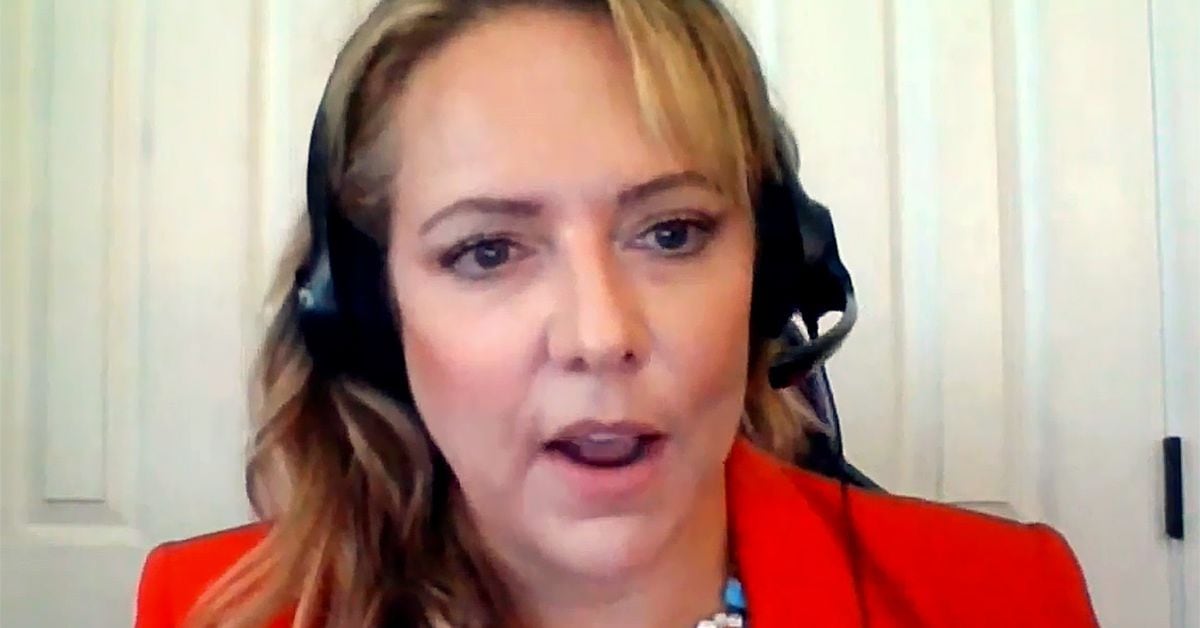Regulation
CFTC Commissioner Summer Mersinger on Overzealous Crypto Regulation and the Need for Legislative Action

Commissioner Summer Mersinger, of the Commodity Futures Trading Commission (CFTC), is one of the few U.S. regulators who is routinely willing to defend the crypto industry and call out what she sees as overzealous oversight. She will be speaking at Consensus 2024 in Austin, Texas, on May 30.
CoinDesk caught up with Mersinger to discuss the Cain and Abel rivalry between the CFTC and U.S. Securities and Exchange Commission (SEC), how her agency decides which enforcement actions to pursue and her views on a variety of issues, including the CME possibly getting into the spot bitcoin market, the emerging world of betting markets and Washington D.C. traffic.
Is it an accurate view that the SEC and the CFTC are in somewhat of a turf war over crypto?
I think there are certainly questions around who has the appropriate authority. There are people between the two agencies who are willing to work together, in fact, at Consensus Commissioner Peirce and I will be speaking together. We have some similar views. But it is a struggle because, sometimes where debate has been leveled – whether it’s an enforcement case or another action we have said falls under our fraud and manipulation enforcement authority – we’re seeing the SEC start to ask questions as though it falls under their jurisdiction. And so there is certainly some tension there. It’s largely the lack of clarity that’s really causing the tension.
You’re in a minority position as a regulator who’s somewhat favorable to crypto. Could you just explain why it is that you’re willing to stick your neck out?
Part of the reason I went into government, generally, is that – while there’s a need for government in people’s lives – we don’t want to overstep. We also want to make sure the rules of the road are clear so that people can abide by the law. This is an area where there is a real problem. A lot of people are very interested in investing in, or trading, cryptocurrencies, and we have not provided any clarity – we’ve made it very murky. That’s not what the government should be doing. It’s creating a situation where you have people relying on the word of a regulator, and the rules of the game are being changed in the middle of the play.
I still think it’s important that we speak up and let people know that, whether you like crypto or not, that’s not the point here. The point is that regulators have really made this confusing and difficult.
Do you agree with Commissioner Pham’s idea that the Government Accountability Office should investigate the CFTC’s enforcement actions?
COMMISSIONER MERSINGER: It’s difficult to ask another agency to come in and look at the internal workings of the CFTC. I understand where Commissioner Pham is coming from and I think it’s that same kind of feeling that we shouldn’t be regulating through enforcement. But I also think this is a leadership question. I greatly respect Chairman Behnam, but this is an issue with the political direction from this White House. So, instead of an audit, we need to ask: Is the problem the agency, or the current political leadership driving our agenda and broadly stifling financial innovation?
I don’t want to put words in your mouth, but is this to suggest that the regulatory landscape would improve if Trump was re-elected in November?
There are clear differences between President Biden and former President Trump, so that does drive the regulatory agenda. So, if leadership changes, you would certainly assume there would be new policies and a new regulatory agenda.
I’m curious to what extent you’re in active dialogue with Congressmembers about potential crypto legislation?
They use us as a resource. We talk to members of the House Financial Services Committee, the Agriculture Committee, and certainly members of the Senate and work with them on where there is ambiguity in the laws or opportunities to make some delineations and clear paths for regulation. It’s offering our assistance and expertise and it’s helpful to have those conversations because they also want to make sure we’re able to implement the laws that they pass. They may have great intentions, but if it’s impossible for the agency to implement then it’s useless.
That makes a lot of sense. Do you think that there needs to be bespoke crypto legislation or would new interpretations of existing laws suffice?
There are some who believe we can use current statutory authority, whether the SEC or the CFTC, to regulate – which is where we see regulation through enforcement actions. I disagree. The only way to get past just bringing enforcement actions is to have something come out of Congress that says “here’s how to handle cryptocurrencies.”
Beyond legislation, the two agencies also need to sit down and come up with some joint rulemaking. We did that with Dodd Frank, and we certainly could do that here. That’s an important piece of making sure people know which regulator is going to regulate them, which door to walk into. There’s no question that without statutory changes to ensure it’s very clear where the jurisdiction is, agencies will try to go in separate directions.
I know every enforcement action is primarily driven by facts on the ground. But I think it might be interesting to get a view into how these cases are built. What is the process of building a case against someone like Avi Eisenberg?
Without talking about any specific enforcement cases, with a lot of these cases it’s been whistleblower reports saying “I think somebody is violating the law.” It could be a victim who says they lost money, and I don’t think what they’re doing is legal. We have a pretty large team of enforcement investigators and attorneys who start building a case. By the time it gets to us at the commission, usually the facts have been pretty well established and how they line up with the law. We’re kind of like a jury that decides whether the facts meet our statutory requirements.
A lot of it is done by the enforcement team that might interview the whistleblower and other employees, get documents. A lot of time goes into each case before it gets to the commission for a vote. There’s also a lot of cooperation between the various agencies, whether it’s the DOJ, state regulators or the SEC. So where there’s opportunities to bring cases under multiple statutes, or different regulators, they’ll work together. It’s more efficient for the government if they can work together. They can also tip each other off. If we had to get every lead, I think it’d be really difficult.
Now one distinction I want to make is you hear a lot of numbers around crypto enforcement cases. I think it’s a little unfair because a lot of these cases are just run of the mill fraud; somebody stealing someone else’s money, someone claiming to buy crypto, but not actually buying the crypto. So we’ve seen this play out with whatever the hot topic is at the time. I’d say every few years the theme changes – it was foreign currencies, it was metals, we saw a lot of gold fraud. Right now crypto is the hot thing. A lot of cases have been portrayed as cryptocurrency fraud, but it’s just fraud with a crypto wrapper around it. So tomorrow, it might be AI fraud.
I almost hate to say it, but given how much fraud centers around crypto, do you think that there should be more enforcement actions?
I think when it’s straight up fraud, yes. There’s a distinction here when you have a case where somebody just takes your money and claims to invest in something and never does – there’s no question who has the authority there. The more we can try to shut some of this down, the better.
But where there’s a policy question around a certain activity and how our statute would fit with that activity, that’s where I get a little nervous. For instance, if we’re looking at a DeFi protocol, and we’re saying they’re violating our statute it can be difficult if we’ve never really said how our statute applies to DeFi.
We’re starting to set out definitions and interpretations based on court cases, because sometimes you’ll find use cases where there are bad actors. Sometimes it’s people who want to abide by the law, but there’s no clear way how they would do that. That’s why I think we’d be better off with rulemaking.
What do you make of the argument that the SEC implicitly said that Ethereum is a commodity when futures went live in 2021?
So this is an interesting question in development. We do have futures products trading on ether. And I do think if somebody decides that ether is a security, it calls into question what happens. We’ve [the CFTC] been regulating those contracts. They operated well, we have no concerns. This was an area where we thought there was clarity, and now we’re not quite sure if there’s clarity and that’s dangerous.
The law is a little strange; commodities can be a lot of other things – you can have a commodity that is a security. The nomenclature gets a little tricky the way the law is written. But we’ve said we believe this is a commodity and we’re going to regulate it as such under CFTC jurisdiction because it is a derivative product. To me that has been clearly laid out and we shouldn’t be introducing new kinds of questions around what has been a clear policy.
Given how interrelated these assets are, do you think the U.S. would be better off with a single unified agency, like the U.K.’s FCA?
I’m always hesitant to recommend any new government agencies or adding more government. History has shown that more government has never been the answer. But I do think sometimes you’ve got to better tailor statutes. Crypto doesn’t neatly fit into any of our financial categories, so we’re gonna have to fine tune some of the law. That’s what Congress does, so we can easily do this without any new agency.
Why is the CFTC so against betting markets?
It’s a very tough, difficult topic because there’s a lot of nuance. So these markets, which we call event contracts, are part of our statute that was added under the Dodd Frank Act. In the grand scheme of things, it’s relatively new, but we’ve seen interest in these contracts for quite some time and it’s certainly ramping up. The way Congress laid it out for us it said these contracts generally are OK, as long as they don’t touch on a number of topics, like gaming, war, terrorism, assassination – anything that’s against federal law. There are a number of people who really don’t like election contracts and would like to include them in this list.
Then there’s this public interest piece that tries to determine whether having this contract would be against the public interest. It’s not necessarily that we are against these markets, but there have to be some guardrails. Congress directed us to have some guardrails, and we’re trying to build them. You see that with our recent vote. My feeling is if that’s the route you want to take, you still have to do a public interest determination for every contract, which is why I dissented because we were limiting elections as a category.
At the end of the day, we want to create a framework where if you’re registered with us, you won’t have a legal question every time you try to do something new. We are just struggling a little bit with the approach. Congress tried to help us create clarity, but certainly left a lot of a lot left to the regulator to figure out.
The Financial Times reported today that CME is thinking about listing spot bitcoin trading, not not just bitcoin futures. Is that something that you are supportive of?
You know, the first time I heard about it was this morning as well, so I haven’t had those conversations. I want to talk a little bit more with CME and with our staff to find out what this means. There’s a lot of questions around custody and other issues. So right now, I don’t have a positive or negative opinion and honestly, as a regulator, I shouldn’t. They should be able to make those market decisions as long as they’re following the rules. We try to be a regulator that is principles based and let our registered entities run the markets, because that’s what they do. Our job is just to make sure everyone’s following the rules.
Quick round of overrated/underrated? You could decline to answer or clarify your position. DeFi?
I don’t have a position one way or the other. I just think as a regulator, we should have clear rules of the road for DeFi.
You know, I’m gonna say Washington D.C. is a little overrated. Mostly because I was just in the Midwest where there was no traffic. It was very pleasant.
Neutral. You know, I’ve never met him. So I try to withhold my opinions of people until I’ve had a chance to sit down and get to know them.
The phrase “sufficiently decentralized?”
You’re either decentralized or you’re not. So I think sufficiently decentralized feels a little overrated because I don’t know what that means. It probably means you’re not decentralized.
What are you most looking forward to at Consensus?
The conversations with so many different stakeholders. This is an opportunity to talk with people we ordinarily wouldn’t see in Washington, D.C. and to have them all in one place is really special.
Thank you again for the time. Nice to meet you both.
Regulation
Crypto community gets involved in anti-government protests in Nigeria

Amid the #EndBadGovernanceInNigeria protests in Nigeria, a notable shift is occurring within the country’s cryptocurrency sector. As the general public demands sweeping governance reforms, crypto community leaders are seizing the opportunity to advocate for specific regulatory changes.
Rume Ophi, former secretary of the Blockchain Stakeholders Association of Nigeria (SiBAN), stressed the critical need to integrate crypto-focused demands into the broader agenda of the protests.
Ophi explained the dual benefit of such requirements, noting that proper regulation can spur substantial economic growth by attracting investors and creating job opportunities. Ophi noted, “Including calls for favorable crypto regulations is not just about the crypto community; it’s about leveraging these technologies to foster broader economic prosperity.”
Existing government efforts
In opposition to Ophi’s call for action, Chimezie Chuta, chair of the National Blockchain Policy Steering Committee, presents a different view. He pointed out The Nigerian government continued efforts to nurture the blockchain and cryptocurrency industries.
According to Chuta, the creation of a steering committee was essential to effectively address the needs of the crypto community.
Chuta also highlighted the creation of a subcommittee to harmonize regulations for virtual asset service providers (VASPs). With the aim of streamlining operations and providing clear regulatory direction, the initiative involves cooperation with major organizations including the Securities and Exchange Commission (SEC) and the Central Bank of Nigeria (CBN). “Our efforts should mitigate the need for protest as substantial progress is being made to address the needs of the crypto industry,” Chuta said.
A united call for support
The ongoing dialogue between the crypto community and government agencies reflects a complex landscape of negotiations and demands for progress.
While actors like Ophi are calling for more direct action and the inclusion of crypto demands in protest agendas, government figures like Chuta are advocating for recognition of the steps already taken.
As protests continue, the crypto community’s push for regulatory reform highlights a crucial aspect of Nigeria’s broader fight to improve governance and economic policies. Both sides agree that favorable regulations are critical to the successful adoption and implementation of blockchain technologies, signaling a potentially transformative era for Nigeria’s economic framework.
Read also : OKX Exchange Exits Nigerian Market Amid Regulatory Crackdown
Regulation
Cryptocurrency Regulations in Slovenia 2024

Slovenia, a small but highly developed European country with a population of 2.1 million, boasts a rich industrial history that has contributed greatly to its strong economy. As the most economically developed Slavic nation, Slovenia has grown steadily since adopting the euro in 2007. Its openness to innovation has been a key factor in its success in the industrial sector, making it a prime destination for cryptocurrency enthusiasts. Many believe that Slovenia is poised to become a powerful fintech hub in Europe. But does its current regulatory framework for cryptocurrencies support such aspirations?
Let’s explore Slovenia’s cryptocurrency regulations and see if they can propel the country to the forefront of the cryptocurrency landscape. My expectations are positive. What are yours? Before we answer, let’s dig a little deeper.
1. Cryptocurrency regulation in Slovenia: an overview
Slovenia is renowned for its innovation-friendly stance, providing a supportive environment for emerging technologies such as blockchain and cryptocurrencies. Under the Payment Services and Systems Act, cryptocurrencies are classified as virtual assets rather than financial or monetary instruments.
The regulation of the cryptocurrency sector in Slovenia is decentralized. Different authorities manage different aspects of the ecosystem. For example, the Bank of Slovenia and the Securities Market Agency oversee cryptocurrency transactions to ensure compliance with financial laws, including anti-money laundering (AML) and terrorist financing regulations. The Slovenian Act on the Prevention of Money Laundering and Terrorist Financing (ZPPDFT-2) incorporates the EU’s 5th Anti-Money Laundering Directive (5MLD) and aligns with the latest FATF recommendations. All virtual currency service providers must register with the Office of the Republic of Slovenia.
2. Cryptocurrency regulation in Slovenia: what’s new?
Several notable developments have taken place this year in the cryptocurrency sector in Slovenia:
July 25, 2024:Slovenia has issued a €30 million on-chain digital sovereign bond, the first of its kind in the EU, with a yield of 3.65%, maturing on 25 November 2024.
May 14, 2024:NiceHash has announced the first Slovenian Bitcoin-focused conference, NiceHashX, scheduled for November 8-9 in Maribor.
3. Explanation of the tax framework for cryptocurrencies in Slovenia
The Slovenian cryptocurrency tax framework provides clear guidelines for individuals and businesses. According to the Slovenian Financial Administration, the tax treatment depends on the status of the trader and the nature of the transaction.
- People:Income earned from cryptocurrencies through employment or ongoing business activities is subject to personal income tax. However, capital gains from transactions or market fluctuations are exempt from tax.
- Companies:Capital gains from cryptocurrency-related activities are subject to a 19% corporate tax. Value-added tax (VAT) generally applies at a rate of 22%, although cryptocurrency transactions that are considered as means of payment are exempt from VAT. Companies are not allowed to limit payment methods to cryptocurrencies alone. Tokens issued during ICOs must follow standard accounting rules and corporate tax law.
4. Cryptocurrency Mining in Slovenia: What You Need to Know
Cryptocurrency mining is not restricted in Slovenia, but income from mining is considered business income and is therefore taxable. This includes rewards from validating transactions and any additional income from mining operations. Both individuals and legal entities must comply with Slovenian tax regulations.
5. Timeline of the development of cryptocurrency regulation in Slovenia
Here is a timeline highlighting the evolution of cryptocurrency regulations in Slovenia:
- 2013:The Slovenian Financial Administration has issued guidelines stating that income from cryptocurrency transactions should be taxed.
- 2017:The Slovenian Financial Administration has provided more detailed guidelines on cryptocurrency taxation, depending on factors such as the status of the trader and the type of transaction.
- 2023:The EU adopted the Markets in Crypto-Assets (MiCA) Regulation, establishing a uniform regulatory framework for crypto-assets, their issuers and service providers across the EU.
Endnote
Slovenia’s approach to the cryptocurrency sector is commendable, reflecting its optimistic view of the future of cryptocurrencies. The country’s balanced regulatory framework supports cryptocurrency innovation while protecting users’ rights and preventing illegal activities. Recent developments demonstrate Slovenia’s commitment to continually improving its regulatory environment. Slovenia’s cryptocurrency regulatory framework sets a positive example for other nations navigating the evolving cryptocurrency landscape.
Read also : Hong Kong Cryptocurrency Regulations 2024
Regulation
A Blank Sheet for Cryptocurrencies: Kamala Harris’ Regulatory Opportunity

photo by Shubham Dhage on Unsplash
As the cryptocurrency landscape continues to evolve, the need for clear regulation has never been more pressing.
With Vice President Kamala Harris now leading the charge on digital asset regulation in the United States, this represents a unique opportunity to start fresh. This fresh start can foster innovation and protect consumers. It can also pave the way for widespread adoption across industries, including real estate agencies, healthcare providers, and online gaming platforms like these. online casinos ukAccording to experts at SafestCasinoSites, these platforms come with benefits such as bonus offers, a wide selection of games, and various payment methods. Ultimately, all this increase in adoption could propel the cryptocurrency market forward.
With this in mind, let’s look at the current state of cryptocurrency regulation in the United States, a complex and confusing landscape. Multiple agencies, including the Securities and Exchange Commission (SEC), the Commodity Futures Trading Commission (CFTC), and the Financial Crimes Enforcement Network (FinCEN), have overlapping jurisdictions, creating a fragmented regulatory environment. This lack of clarity has stifled innovation as companies are reluctant to invest in the United States, fearing regulatory repercussions. A coherent and clear regulatory framework is urgently needed to realize the full potential of cryptocurrencies in the United States.
While the US struggles to find its footing, other countries, such as Singapore and the UK, are actively looking into the cryptocurrency sector by adopting clear and supportive regulatory frameworks. This has led to a brain drain, with companies choosing to locate in more conducive environments.
Vice President Kamala Harris has a unique opportunity to change that narrative and start over. Regulation of cryptocurrencies. By taking a comprehensive and inclusive approach, it can help create a framework that balances consumer protection with innovation and growth. The time has come for clear and effective regulation of cryptocurrencies in the United States.
Effective regulation of digital assets is essential to foster a safe and innovative environment. The key principles guiding this regulation are clarity, innovation, global cooperation, consumer protection, and flexibility. Clear definitions and guidelines eliminate ambiguity while encouraging experimentation and development to ensure progress. Collaboration with international partners establishes consistent standards, preventing regulatory arbitrage. Strong safeguards protect consumers from fraud and market abuse, and adaptability allows for evolution in response to emerging trends and technologies, striking a balance between innovation and protection.
The benefits of effective cryptocurrency regulation are multiple and far-reaching. By establishing clear guidelines, governments can attract investors and mainstream users, driving growth and adoption. This can, in turn, position countries like the United States as global leaders in fintech and innovation. Strong safeguards will also increase consumer confidence in digital assets and related products, increasing economic activity.
A thriving crypto industry can contribute significantly to GDP and job creation, which has a positive impact on the overall economy. Furthermore, effective regulation has paved the way for the growth of many businesses such as tech startups, online casinos, and pharmaceutical companies, demonstrating that clear guidelines can open up new opportunities without stifling innovation. This is a great example of how regulation can allay fears of regressive policies, even if Kamala Harris does not repeal the current progressive approach. By adopting effective regulation, governments can create fertile ground for the crypto industry to thrive, thereby promoting progress and prosperity.
Regulation
South Korea Imposes New ‘Monitoring’ Fees on Cryptocurrency Exchanges

Big news! The latest regulatory changes in South Korea are expected to impact major cryptocurrency exchanges like Upbit and Bithumb. Under the updated regulations, these platforms will now have to pay monitoring fees, which could cause problems for some exchanges.
Overview of new fees
In the latest move to regulate cryptocurrencies, the Financial Services Commission announced on July 1 the revised “Enforcement Order of the Act on the Establishment of the Financial Services Commission, etc.” update “Regulations on the collection of contributions from financial institutions, etc.” According to local legislation newsThe regulations require virtual asset operators to pay supervisory fees for inspections conducted by the Financial Supervisory Service starting next year. The total fees for the four major exchanges are estimated at around 300 million won, or about $220,000.
Apportionment of costs
Upbit, which holds a dominant market share, is expected to bear more than 90% of the total fee, or about 272 million won ($199,592) based on its operating revenue. Bithumb will pay about 21.14 million won ($155,157), while Coinone and GOPAX will contribute about 6.03 million won ($4,422) and 830,000 won ($608), respectively. Korbit is excluded from this fee due to its lower operating revenue.
Impact on the industry
The supervision fee will function similarly to a quasi-tax for financial institutions subject to inspections by the Financial Supervisory Service. The new law requires any company with a turnover of 3 billion won or more to pay the fee.
In the past, fees for electronic financial companies and P2P investment firms were phased in over three years. However, the taxation of virtual asset operators has been accelerated, reflecting the rapid growth of the cryptocurrency market and increasing regulatory scrutiny.
Industry reactions
The rapid introduction of the fee was unexpected by some industry players, who had expected a delay. Financial Supervisory Service officials justified the decision by citing the creation of the body concerned and the costs already incurred.
While larger exchanges like Upbit and Bithumb can afford the cost, smaller exchanges like Coinone and GOPAX, which are currently operating at a loss, could face an additional financial burden. This is part of a broader trend of declining trading volumes for South Korean exchanges, which have seen a 30% drop since the new law went into effect.
-

 Regulation12 months ago
Regulation12 months agoRipple CTO and Cardano founder clash over XRP’s regulatory challenges ⋆ ZyCrypto
-

 Regulation10 months ago
Regulation10 months agoNancy Pelosi Considers Supporting Republican Crypto Bill FIT21 – London Business News
-

 Videos11 months ago
Videos11 months agoCryptocurrency News: Bitcoin, ETH ETF, AI Crypto Rally, AKT, TON & MORE!!
-

 Regulation11 months ago
Regulation11 months agoBitcoin’s future is ‘bleak’ and ripe for regulation, says lead developer
-

 News9 months ago
News9 months agoAave Price Increases Following Whales Accumulation and V3.1 Launch
-

 Regulation9 months ago
Regulation9 months agoSouth Korea Imposes New ‘Monitoring’ Fees on Cryptocurrency Exchanges
-

 Regulation9 months ago
Regulation9 months agoA Blank Sheet for Cryptocurrencies: Kamala Harris’ Regulatory Opportunity
-

 Regulation9 months ago
Regulation9 months agoCryptocurrency Regulations in Slovenia 2024
-

 News11 months ago
News11 months agoThe trader earned $46 million with PEPE after reaching a new ATH
-

 Regulation11 months ago
Regulation11 months agoCrypto needs regulation to thrive: Tyler Cowen
-

 Blockchain11 months ago
Blockchain11 months agoSolana ranks the fastest blockchain in the world, surpassing Ethereum, Polygon ⋆ ZyCrypto
-

 Blockchain11 months ago
Blockchain11 months agoSolana Surpasses Ethereum and Polygon as the Fastest Blockchain ⋆ ZyCrypto

















